by Heather Kent | Sep 16, 2016
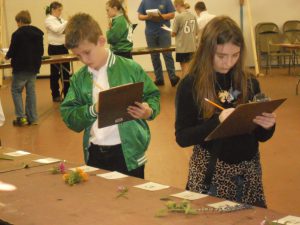
Youth competing at the North Florida Fair Horticulture Judging Contest. Photo credit: UF IFAS Leon County 4-H
For parents who want their child to be prepared for the 21st century workforce, participating in a 4-H judging team may be the answer. Several universities have recently published studies on the impacts 4-H judging teams have had on workforce readiness. The University of Georgia surveyed over 1,300 4-H alumni who reported that judging programs helped them develop confidence and communication and decision making skills (McCann & McCann 1992). A 2005 University of Idaho study found that 97% of alumni indicated that their 4-H judging experience positively influenced their personal success as adults (Nash & Sant, 2005). Similar results were found in studies conducted by Rutgers and the University of Missouri. The life skills attained through judging programs are not only sought-after by employers but are applicable to most professions. In addition, these skills are not always taught in school or on the sports field but are intentionally integrated into the 4-H positive youth development program.
Florida 4-H Alumna (and national poultry and meats judging champion) Stacey Warden shared: “I would not be the person I am today if I had not joined 4-H. 4-H [judging teams] helped me learn how to speak in front of others, build confidence and gave me so many opportunities I would not have had otherwise.” One Missouri 4-H alumna shared: “I have had the chance to meet some of the greatest people in the world, visit many different states, and gain ever so vital experiences in public speaking. Giving oral reasons has helped me sharpen my speaking abilities. In today’s society, communication is the key to success (Sheppard 2005).”
Florida 4-H offers many opportunities for youth to be involved in a judging team. While livestock judging may be the most recognized, we also offer judging programs in forestry,
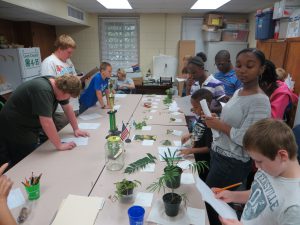
Leon County Master Gardeners help youth practice for the Horticulture Judging Contest.
poultry, land/soils, meats, horticulture, consumer choices, horse, dairy goat and marine ecology. Mastering the subject matter content is only one aspect of the program. Youth work as a team to correctly identify animals, plants, or parts. They also have to learn to make close observations and think on their feet to evaluate the quality of an animal, plant, or product. They master communication and presentation skills by defending their choices in front of a judge (this is called giving oral reasons). The real goal of these programs is to help youth develop confidence, communication and decision making skills that will help them be successful adults in work and personal life later on.
Over the next couple of weeks, we will feature different judging opportunities that will be available this fall at the North Florida Fair. This week, our feature is on the 4-H Horticulture Judging Program. Do you know the difference between opposite, alternate, whorled and palmate leaves? Can you tell the difference between poison ivy and Virginia creeper? Do you know what to look for when purchasing shrubs for your landscape? Youth involved in the 4-H Horticulture judging team do! Horticulture judging is a great way to learn how to correctly identify plants and learn about Florida’s horticulture industry, which is ranked second in the nation and is a billion dollar industry for our state!
Getting started is easy! First, download a copy of the rules and glossary. Begin to familiarize yourself with plant terms so that you can become proficient at plant identification and use of keys. Next, take a look at the online tutorial. There are four modules:
Last but not least, quiz yourself- visit a local grocery store or nursery and see how many fruits, vegetables and plants you can correctly identify! The next opportunity to participate in a horticulture judging contest will be Saturday, November 12th at the North Florida Fair. The state contest is usually held in Gainesville in July in conjunction with 4-H University,
If you have a passion for plants or the horticulture industry, consider coaching or participating in a 4-H horticultural judging team. Together, let’s grow 4-H to help the next generation develop 21st century workforce skills for Florida! Contact your local UF IFAS County Extension Office to sign up as a volunteer or member, or visit http://florida4h.org. Next week, we will feature our consumer choices judging contest.
References:
McCann, J. S., & McCann, M. A. (1992). Judging team members’ reflection on the value of livestock, horse, meats, and wool judging programs. The Professional Animal Scientist, 8, 7–13.
Nash, S. A., & Sant, S. L. (2005). Life-skill development found in 4-H animal judging. Journal of Extension [Online], 43(2) Article 2RIB5. Available at:http://www.joe.org/joe/2005april/rb5.php
Sheppard, L. (2005). Where would I be without 4-H? Missouri Ruralist, October 2005.
by Heather Kent | Jul 8, 2016
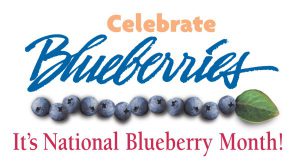 Did you know that July is National Blueberry Month? Blueberries are in season now, and reasonably priced at grocery stores, fruit stands, and farmers’ markets. Many growers also offer a “pick your own” service which can be a fun family outing. The good news is that this delicious treat has many health benefits. Blueberries are low in calories- only 80 calories per cup but are packed with nutrients. A handful of blueberries satisfy the recommended intake of dietary fiber. They are also high in vitamin C- one serving provides 25% of your daily requirement. Blueberries are also high in manganese, which helps the body process cholesterol and nutrients such as carbohydrates and protein.
Did you know that July is National Blueberry Month? Blueberries are in season now, and reasonably priced at grocery stores, fruit stands, and farmers’ markets. Many growers also offer a “pick your own” service which can be a fun family outing. The good news is that this delicious treat has many health benefits. Blueberries are low in calories- only 80 calories per cup but are packed with nutrients. A handful of blueberries satisfy the recommended intake of dietary fiber. They are also high in vitamin C- one serving provides 25% of your daily requirement. Blueberries are also high in manganese, which helps the body process cholesterol and nutrients such as carbohydrates and protein.
Blueberries are a native North American plant, and it was only within the last 100 years that we have been able to grow them commercially. All thanks to Elizabeth White, the daughter of a New Jersey farmer, teamed up with USDA botanist Frederick Coville to domesticate the blueberry. They spent years identifying blueberry plants with desirable qualities for cultivation. They harvested and sold the first cultivated crop of blueberries in 1916- exactly 100 years ago! Until 20 years ago, blueberries could only be grown in northern climates like New Jersey, Maine, and Michigan. Thanks to the University of Florida, southern blueberry cultivars were developed through research that don’t require as many chilling hours and bear more fruit. Although Florida is not currently the leading producer of blueberries, we are quickly catching up with 25 million pounds produced annually!
Fun Facts about Blueberries:
- Blueberries are relatives of the rhododendron family
- The perfect blueberry should have a “dusty’ appearance
- Don’t wash your blueberries until you are ready to eat them (washing speeds up the spoiling process).
- To freeze blueberries, place them unwashed, on a cookie sheet and flash freeze. Then place them in quart-size freezer bags to use later in smoothies, crumbles, cobblers, or ice cream.
- Recent studies show that blueberries may have the potential to aid in memory loss, vision loss and even slow down the aging process
- Native Americans recognized the nutritional value of blueberries and used them for medicinal purposes as well as flavorings
- Early American Colonists used blueberries to dye fabric and also to color paint
This month, celebrate the blueberry by planting a bush, visiting a U-pick farm, or making a tasty home-made blueberry treat. Fresh From Florida (a division of the Florida Department of Ag) has lots of free and delicious recipes. Try Florida Blueberry Parfait, Blueberry Breakfast Casserole, Blueberry and Blue Cheese Salad or even Blueberry Barbecue Sauce!
Additional UF/IFAS Resources about Blueberries:
by Whitney Cherry | Apr 13, 2016
Jerry is a retiree and currently volunteers in the 4-H learning gardens in Calhoun County, working as he is available. He also answers my many gardening questions and offers advice. I’m grateful for his commitment to the Calhoun County 4-H program, and am glad to share his 4-H story with you today in his own words. Jerry says:
“I became involved in 4-H at age nine so that I could go to camp. My older sister and brother were going, and I didn’t want to be left out. At camp, I caught the 4-H “bug” and it has never let me go.
As a member of 4-H, I always found new and interesting challenges to do such as learning to swim at camp, collecting insects, growing a garden, raising and showing calves and pigs, farm judging at North Florida Fair, judging beef cattle at Tampa, Florida and dairy cows at Waterloo, Iowa, and attending 4-H Congress at Gainesville. All provided experiences and knowledge that were not available to me elsewhere.
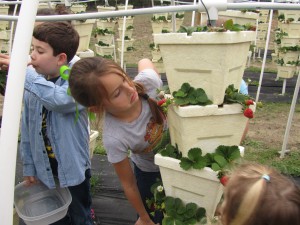
Youth enjoying the Calhoun County 4-H Learning Gardens which Mr. Wyrick helps to maintain.
Now in a volunteer capacity, I enjoy watching members grow and enjoy new and novel experiences which are available through 4-H Club programs and knowing that I am helping young people grow to be positive examples for their peers. “I continue to volunteer with 4-H because of the payback of having previous 4-H members relate to me what 4-H meant to them and how it helped them to achieve their personal accomplishments. If young people are expected to be positive influences on society, they must be provided examples and knowledge of meaningful lives. They must be exposed to new ideas and experiences so that they know choices are available to them. If the next generation is to be different – is to be a positive generation – they must be taught as young people. There are no better teaching methods than those available through 4-H Club programs.”
If you are not already a volunteer, think about sharing your talents with us! You can fuel the extraordinary efforts of our youth by joining us as a volunteer. To find out more, contact your local UF IFAS Extension Office or visit http://florida4h.org/volunteers. Happy National Volunteer Appreciation Week!
by pmdavis | Feb 5, 2016
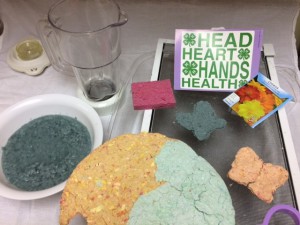
Grow Card Supplies and products
4-H literally got its start with gardening. The very first 4-H Clubs focused on growing tomatoes and corn for boys and canning for girls. Many youth and volunteers still enjoy gardening projects today. One great curricula that is used is the Junior Master Gardening Program. This program allows youth to enhance their life using gardening as the spark of interest. Gardening enriches youth’s lives, promotes good health, gives a sense of environmental awareness and saves money.
One of the activities I enjoy doing with youth combines gardening with recycling and crafting. As a group we will make our own paper grow cards or ornaments that have seeds embedded in them. Once the cards are dry, we deliver them as a service project. The cards are fun and inexpensive to make and are a perfect activity for your next club meeting! Try making them as valentines for Valentines Day. For beginners, we recommend growing tomatoes, lettuce, peppers, cucumbers, basil, chives, or parsley. Not into vegies? Try starting marigolds, cosmos, sunflowers, zinnias, pansies, or petunias.
Download our detailed factsheet with photos and directions. This activity is great for any occasion when you need a card or small gift. You can use as party favors by making them into ornaments using raffia to hang them from a tree or gift bag. You can take them to a nursing home, veterans center, hospital or other site as a service project for your club. Just be sure to share with the individual that they need to plant your card or ornament. It is a great way to help youth share their joy of gardening with others.
Other Extension gardening resources include:
• Florida Vegetable Gardening Guide
If you have a green thumb, consider going “totally green” as a 4-H gardening volunteer! 4-H needs caring adults like you to share their knowledge and passion for gardening with the next generation. Through the 4-H gardening project, youth not only learn gardening knowledge and skills, they also learn responsibility, teamwork, and other life skills that will help them grow up to be compassionate and competent citizens. To get involved, contact your local UF IFAS Extension Office, or visit Florida 4-H.
by Stefanie Prevatt | May 29, 2015
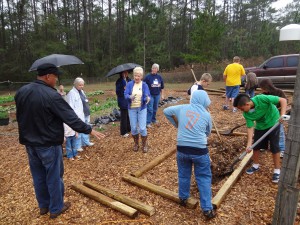
Photo credit: Zulema Wibmer, 4-H Program Assistant, Leon County 4-H Office
Garden-based education is taking America by storm. While this is concept dates as far back as the seventeenth century, it certainly feels like the popular movement of the day. 4-H has been using garden based education since 1902 with tomato and corn clubs to teach life skills such as resiliency, planning and organizing, and communication. These same skills are necessary to become a successful entrepreneur:
Resiliency: the ability to try again after failure. A garden is the perfect place for youth to test ideas or try new things. As adults, we know that sometimes the key to success is (safe) failure! If you are using a garden your classroom, allow creative experimentation. Success will build on itself and trials that missed the mark will make for more lively discussion and group cohesion.
Planning/organizing: the process of figuring out what to do (planning) and how to do it (organizing). Whether you are starting new or continuing an existing project, allowing the expression of youth ideas and goals – followed by their help implementing these plans – is crucial to your project’s success. Remember, we can grow all the vegetables in the world, but if the youth don’t learn or feel a sense of accomplishment related to the project, all we did was grow vegetables.
Communication: the exchange of thoughts, messages, or information, as by speech, signals, writing, or behavior. In today’s tech savy world, we are losing the ability to communicate in person and in writing. You have a unique opportunity to work with your group together, or as individuals, to discuss (or write descriptively) about your garden.
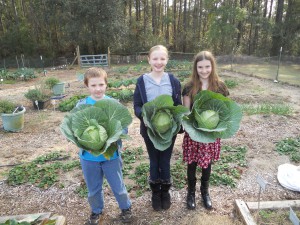
Photo credit: Zulema Wibmer, 4-H Program Assistant, Leon County 4-H Office
UF IFAS Extension offers many resources to help both youth and adults become entrepreneurs in the food industry. Food entrepreneurship has really exploded with the Cottage Food Law. Many County Extension Offices offer workshops and seminars on food entrepreneurship, and there are also some great online resources to help you get started:
If you have a green thumb, consider going “totally green” as a 4-H gardening volunteer or Master Gardener. 4-H needs caring adults like you to share their knowledge and passion for gardening with the next generation. Through the 4-H gardening project, youth not only learn gardening knowledge and skills, they also learn responsibility, teamwork, and other life skills that will help them grow up to be compassionate and competent citizens. To get involved, contact your local UF IFAS Extension Office, or visit http://florida4h.org./volunteers.
Your opinion matters! Please provide feedback on this short survey to help us improve our blog: https://ufl.qualtrics.com/SE/?SID=SV_3gtLKjqia3F75QN
by Melanie Taylor | May 22, 2015
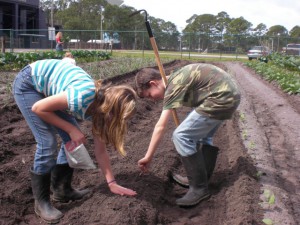
Planting Time
Did you know that something as simple as a garden can help youth not only learn to love vegetables, but also improve their science scores? Fifth-graders at Port St. Joe and Wewahitchka Elementary Schools experienced the benefits of gardening this year through the 4-H Seed to Plate Program. This program teaches youth how to plant, maintain, and harvest a vegetable garden, and is part of the science curriculum taught by 5th grade teachers.
Before the 130 students ever stepped foot in the garden they spent class time discussing the act of planting, the role that bees play in pollination and took a field trip to the North Florida Research and Education Center for 4-H Ag Adventures Day. This program is under the direction of Gulf County Extension Director Roy Lee Carter. The garden program is also supplemented with nutritional and food safety programs taught by Gulf County 4-H/Family & Consumer Science Agent, Melanie Taylor and Family Nutrition Program Assistant, Kay Freeman.
Carter said that the fifth grade is the ideal age level to learn gardening because the students are able to retain what they learn, and apply their new skills at home. The program is part of the science classes taught by the fifth-grade teachers each year. David and Sally Beyl have been volunteers with the program for the last seven years. Both are Master Gardeners who trained at the University of Florida for 12 weeks and contribute more than 50 hours of horticulture-related volunteer work each year.
“The students love it,” said David Beyl. “You can tell that they enjoy the experience.”
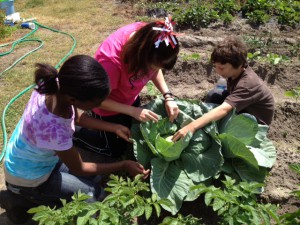
Harvest Time
A portion of what grows in the gardens was donated by Bonnie Plants in Alabama, the Florida Farm to School program, and the University of Florida’s Institute of Food and Agricultural Sciences. The Farm to School Partnership (administered by IFAS) works with local farmers to improve the supply of fresh produce to schools. Cabbage, lettuce, strawberries, potatoes, carrots, onions, eggplant, watermelon, beans, peppers, squash, sugarcane and various herbs made up this year’s garden with produce grown in-ground and in pots. “We use pots to show the students that even if you don’t have room for a garden, you can still have a garden,” Beyl said. In small groups, students learned how to plant seeds, rake, fertilize, cultivate, and harvest. Students even took home cabbages, carrots and potatoes to prepare and share with their families. Those who had an interest in starting their own gardens were given seeds to plant at home.
The highlight of the program is a luncheon prepared by cafeteria staff with produce grown by students. Everything the students munched on came from the garden they spent eight months cultivating. Both school principals are supportive and find this hands-on opportunity a great addition to the science program. This 4-H and public school collaboration is a very successful, educational and fun-filled learning experience.
If you have a green thumb, consider going “totally green” as a 4-H gardening volunteer or Master Gardener. 4-H needs caring adults like you to share their knowledge and passion for gardening with the next generation. Through the 4-H gardening project, youth not only learn gardening knowledge and skills, they also learn responsibility, teamwork, and other life skills that will help them grow up to be compassionate and competent citizens. To get involved, contact your local UF IFAS Extension Office, or visit http://florida4h.org./volunteers.
Your opinion matters! Please provide feedback on this short survey to help us improve our blog: https://ufl.qualtrics.com/SE/?SID=SV_3gtLKjqia3F75QN.









